
views
X
Research source
Having ED is stressful, and some men struggle with opening up to their partner about their condition. Here are some things to consider to help make the conversation easier for both you and your partner.
Approaching the Problem

Educate yourself. There are many misconceptions about impotence. You need to educate both you and your partner on the causes of ED to clear up these myths. Some common myths about ED include: ED is just part of aging. This is not true. It is not just older men who get ED. Some young men may get ED due to another health problem or a psychological issue. Drinking will make sex easier. Drinking before having sex may cause more problems because drinking can worsen ED. You can't talk to your doctor about ED. Also not true. ED is a medical condition and you should talk to your doctor about it. There is no cure for ED. In reality, almost all cases of ED are treatable.

Choose an appropriate time and place. You are probably nervous about revealing to your partner that you have erectile dysfunction. Have a plan to determine the best time and place to engage in a heart-to-heart conversation with your partner. Make sure you choose a place where you and your partner will be most comfortable. Perhaps the bedroom would not be the best place to talk to avoid associating the bedroom with such a sensitive topic.

Prepare your opening. Sometimes it’s hard to find the right words when addressing a sensitive topic. Consider practicing what you will say during the opening of your conversation. It might be easiest to begin by telling your partner that you are uncomfortable talking about your erectile dysfunction. For example, you might say, “I’m really embarrassed to talk about this, but I want to talk about the problem I’ve been having when we’re having sex.”

Be open and honest about your feelings. You partner needs to know how you’re feeling about having erectile dysfunction. Explain how your feelings impact you emotionally and mentally. This will go a long way in helping your partner get a better understanding of what you are going through and how to support you as well. For example, you might say, “I feel like our entire relationship has changed because of ED. Who wants to be with a man that struggles with keeping things going in bed. When I start thinking like this, I just want to be left alone.”

Listen to your partner. Try to understand that your partner may have a lot of questions and concerns about what you have shared. Be open to hearing your partner out. You might find the conversation uncomfortable and even a bit embarrassing. Your partner might express feelings of disbelief or hopelessness. This is normal, however, remind yourself that you’ve now tackled the hardest part, and you should be proud of yourself.
Avoiding the Blame Game
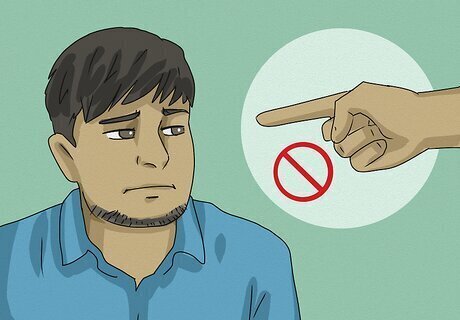
Avoid blaming yourself. You are probably experiencing a range of emotions, including blaming yourself. Male sexual arousal is a complex process that involves the brain, hormones, emotions, muscles and blood vessels, along with many different physical and psychological issues. It is pointless and futile to blame yourself.
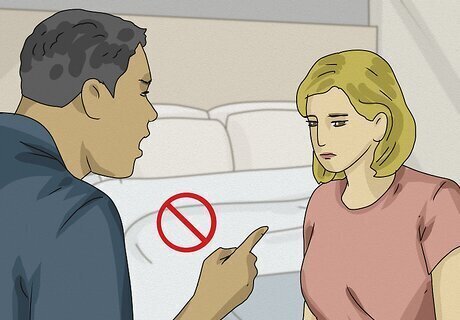
Avoid blaming your partner. Sometimes it’s easier to lash out and blame others when dealing with life challenges. However, this is counterproductive and only result in creating resentment and hurt feelings. For example, avoid making blame statements like “you need to wear sexier lingerie,” or "If you weren’t stressing me all of the time, I wouldn’t have this problem.”

Reassure your partner. Your significant other may also be struggling with his or her own guilt. They might be wondering if they are somehow responsible for creating or exacerbating your impotence. Try to be supportive and understanding of your partner’s feelings. Your partner may be worrying that you no longer find her or him attractive. Try saying something like, “I think you are beautiful and I am still attracted to you. This has nothing to do with the way I feel about you.” For example, you might find your partner saying things like “I guess you don’t find me as attractive as you used to when I younger,” or “maybe I’ve just gained too much weight.” You can respond by making a reassuring statement such as, “That’s not true. You are as beautiful as you’ve always been. My impotence is not about you at all.”
Exploring Treatment Options
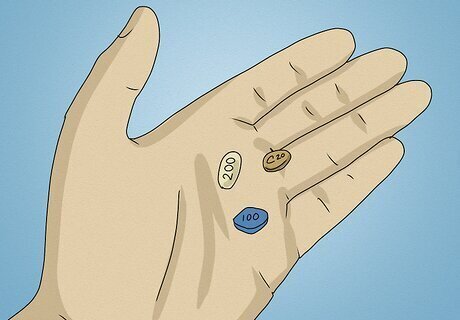
Explore drug treatments. In recent years, the medical community has made much advancement in treating erectile dysfunction through the use of medications. Medications can be taken orally, injected, and inserted into the tip of the penis. Talk to your partner about drug treatment options. You can try different options together and decide which choice is best for you based on your performance, your partner's experience, and any side effects. Some common oral ED medications include Viagra, Cialis, Stendra and Levitra. A doctor may prescribe a drug called alprostadil when pill treatment is deemed unsafe or ineffective. Alprostadil is injected into the side of the penis with a fine needle and it produces an erection that lasts for about 20 to 40 minutes.

Seek counseling. Stress can cause erectile dysfunction. Talk with a counselor about the various stressors in your life to help you learn how to cope and to develop strategies in handling it. This can help reduce sexual anxiety and improve your sexual function. Including your partner in your sex therapy sessions may also help. Your partner can offer a different perspective on your relationship and yourself that might help you to overcome ED.
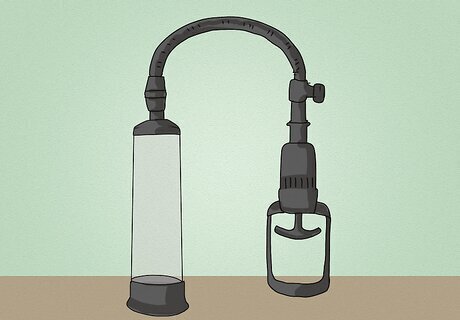
Consider using vacuum devices. Vacuum devices, also known as penis pumps, may help to improve the flow of blood to the penis. The device goes over your penis and it uses suction to pull more blood into your penis, which causes an erection. Then, you place a band around the base of your penis to keep the blood in your penis and maintain the erection during intercourse. Your doctor can recommend or prescribe a good penis pump if you want to try this option.
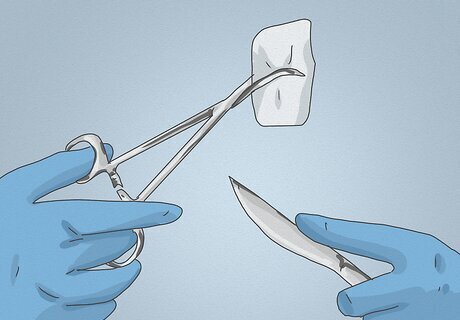
Discuss surgery as a last resort. If all other options for treating erectile dysfunction have failed, you and your partner might want to talk with your doctor about surgical options. The two most common surgeries are placing an implant into the penis or vascular reconstruction surgery, which is rarely recommended. Penile implants consist of inflatable or semi-rigid rods that are placed in the sides of your penis. These rods will make it possible for you to have an erection and many men who have this procedure are satisfied with the results.




















Comments
0 comment